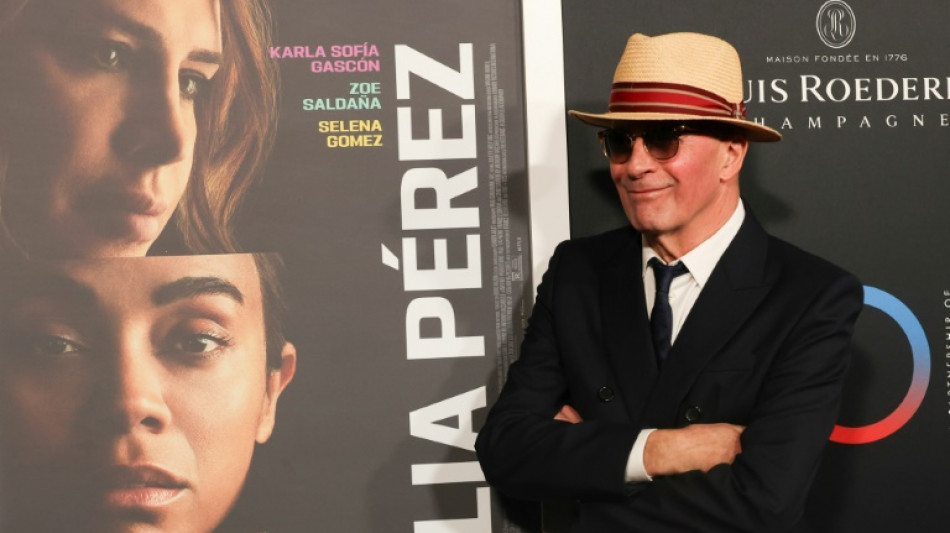
RBGPF
0.1600


His film "Emilia Perez" won multiple prizes at Cannes, and was snapped up by Netflix. Now French director Jacques Audiard is steeling himself for the next, arduous stage -- a glitzy yet grueling campaign as an Oscars frontrunner.
"I'm terrified," Audiard told AFP in an interview in Los Angeles, before the surreal musical about a transgender Mexican drug lord hits limited US theaters this Friday, before streaming on November 13.
"Mass success is something very unsettling -- it's not real life."
With his movie a favorite for the best picture Academy Award, and tipped for nods in categories from best actress to best director, the 72-year-old Audiard will be shuttling back and forth from France to the United States for the next several months.
Modern Oscars campaigns involve a swirl of galas, press conferences, screenings and smaller awards shows, each offering chances to press the flesh with mercurial Hollywood voters in an expensive and crowded marketplace.
Netflix, which has come to dominate Hollywood's vital streaming sector but has yet to win the coveted best picture Oscar, intends to use all its considerable heft in promoting Audiard's 10th feature.
Following North American festival appearances in Telluride in August and Toronto in September, "Emilia Perez" opens The American French Film Festival (TAFFF) in Los Angeles this week.
The campaign promises to be much more intense than in 2010, when Audiard's film "A Prophet" was nominated for an Oscar in the lower profile though still highly prestigious best international film category.
"It's like going from a provincial competition to the Olympics," said Audiard, a Parisian dandy, who wore a leopard-print shirt and a scarf around his neck under his blue suit.
- 'A revelation' -
Audiard's genre-hopping film -- winner of the Jury Prize at Cannes -- is the story of the repentance of Manitas, a powerful Mexican drug lord.
Trapped in a violent, macho world, Manitas employs a lawyer (Zoe Saldana) to arrange a deep, lifelong aspiration -- to become a woman, named Emilia.
Finally free to be herself, Emilia begins a crusade to help victims of the narco gangs. She also reconnects with her former wife (Selena Gomez) and children, who believe she is dead, by posing as a distant relative.
Playing both Manitas and Emilia, Karla Sofia Gascon is heavily tipped to become the first openly transgender actress ever nominated for an Oscar.
Indeed, Gascon heavily shaped the role. Audiard had originally envisioned a younger heroine, but upon meeting the Spanish star who transitioned at 46, he quickly reworked the script.
A younger character would not have suffered enough to be credible, he told AFP.
"I tried hard to make it work, but it didn't add up," said Audiard.
"When Karla Sofia appeared, it was a revelation. It was like the Virgin appeared before me -- it was so clear."
"When you transition at 46, I can't even dare to imagine what her experience was like before... what was her life and her pain?"
This epiphany helped Audiard give more substance to his transgender heroine, who was first inspired by the Boris Razon novel "Ecoute."
- 'Kitsch' -
Borrowing stylings from opera, "Emilia Perez" is billed as a musical drama but stands at the crossroads of multiple genres -- narco-thriller, Latin American telenovela, and LGBTQ drama, among others.
That unique combination was, for Audiard, the "obvious" way to embrace his heroine's transition and the many contradictory facets of her personality.
The film's "kitsch" trappings insolently address social issues, such as when choirs sings the refrain "Rhinoplasty! Vaginoplasty" in a hospital-set dance sequence, he said.
"It had to absorb everything. It's a film that has to be embarrassing," Audiard said. "We are singing about things that are improbable."
Those unlikely ingredients have combined to make a work hailed in the American press as one of the leading Oscars contenders, with nominations set to be revealed in January. The ceremony takes place on March 2.
Success would be a crowning achievement for Audiard's award-winning career, in which he has repeatedly put diverse outsiders at the center of his films.
"Dheepan", which won the Cannes top prize Palme d'Or in 2015, followed the lives of Tamil refugees in a Paris suburb. "Rust and Bone" chronicled an orca trainer who lost her legs in a horrific accident. "A Prophet" delved into the world of prison violence.
"I am a curious person," said Audiard.
"I'm fascinated by people who are difficult to categorize."
K.Inoue--JT